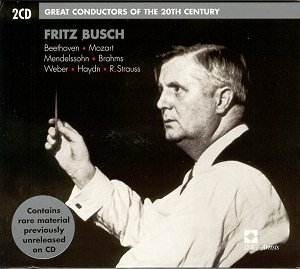As part of their series entitled Great Conductors
of the Twentieth Century (each disc of which purports to ‘contain
rare material previously unreleased on CD’) it comes as no surprise
to find that Fritz Busch is included. He is probably best remembered
in Britain as Glyndebourne’s first Music Director between the years
1934 and his untimely death at 61 in 1951. Busch, brother of violinist
Adolf and cellist Hermann, had a meteoric rise in opera houses in the
first two decades of twentieth century Germany and was a driving force
in that country’s Verdi revival (whose Macbeth he introduced
to Britain before the Second World War). Summarily dismissed by the
Nazis from Dresden in 1933, he worked in Buenos Aires, Copenhagen, Britain
and Sweden. He spent the war years in North and South America, and then
four years conducting at New York’s Met, returning to Glyndebourne in
1950 and taking its productions to Edinburgh’s new Festival in 1950.
Unsurprisingly he was a fine Mozart conductor (bringing both Idomeneo
and Cosi fan tutte out of virtual obscurity), but he also had
an affinity with the operas of Richard Strauss, who dedicated Arabella
to him after his conducting the premieres of Die ägyptische
Helena and Intermezzo to the composer’s complete satisfaction.
Busch was a keen promoter of new works by such composers as Busoni,
Weill, Hindemith, Schoeck, Reger, Schoenberg, Bartok, Stravinsky, Berg
and Honegger much to the displeasure of the Nazi régime.
This highly satisfying compilation is entirely representative
of the art of Fritz Busch. The two overtures capture the drama of the
opera house where he worked so predominantly. The Brahms works remind
us that he was only a step away from the composer himself for his teacher
was Fritz Steinbach, a conductor much favoured by Brahms. Mendelssohn
and Mozart sparkle in his hands while the Haydn (another work he helped
to resurrect) radiates the joys and intimacy of chamber music (a pity
his two brothers, who played the concert, could not make the recording
which followed in January 1951). It all ends with a blazing account
of Don Juan, the one track from pre-war days and featuring the
LPO from that distant era.
This reviewer felt Fritz Busch’s influence on two counts,
studying in Cologne with one of his pre-war assistants, and then in
Glyndebourne where even in my first year of twelve on its music staff
(1971/2 and 1977-86) his presence was still felt, and where he was often
spoken of particularly by John Pritchard, who began his career as Busch’s
right hand man. He was renowned for his humour, humility and utter sincerity,
qualities easily discernible in the results on this invaluable record
of a conductor much loved by his players. If a conductor can achieve
that, then the rest is comparatively straightforward.
Christopher Fifield


